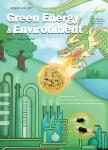Bimetallic catalysts as electrocatalytic cathode materials for the oxygen reduction reaction in microbial fuel cell:A review
作者机构:College of Municipal and Environmental EngineeringMinistry of Education Key Laboratory of Songliao Aquatic EnvironmentJilin Jianzhu UniversityJilin130118China College of Environmental Science and EngineeringMinistry of Education Key Laboratory of Pollution Processes and Environmental CriteriaRemediation and Pollution Control for Urban Ecological EnvironmentalNankai UniversityTianjin300350China
出 版 物:《Green Energy & Environment》 (绿色能源与环境(英文版))
年 卷 期:2023年第8卷第4期
页 面:1043-1070页
核心收录:
学科分类:0830[工学-环境科学与工程(可授工学、理学、农学学位)] 0808[工学-电气工程] 08[工学] 0807[工学-动力工程及工程热物理]
基 金:supported by the National Key R&D Program of China (2019YFC1804102) the National Natural Science Foundation of China (32171615)
主 题:Bimetallic catalysts Oxygen reduction reaction Microbial fuel cell Wastewater treatment Power generation
摘 要:Microbial fuel cell(MFC) is one synchronous power generation device for wastewater treatment that takes into account environmental and energy issues, exhibiting promising potential. Sluggish oxygen reduction reaction(ORR) kinetics on the cathode remains by far the most critical bottleneck hindering the practical application of MFC. An ideal cathode catalyst should possess excellent ORR activity, stability, and costeffectiveness, experiments have demonstrated that bimetallic catalysts are one of the most promising ORR catalysts currently. Based on this, this review mainly analyzes the reaction mechanism(ORR mechanisms, synergistic effects), advantages(combined with characterization technologies), and typical synthesis methods of bimetallic catalysts, focusing on the application effects of early Pt-M(M = Fe, Co, and Ni) alloys to bifunctional catalysts in MFC, pointing out that the main existing challenges remain economic analysis, long-term durability and large-scale application, and looking forward to this. At last, the research trend of bimetallic catalysts suitable for MFC is evaluated, and it is considered that the development and research of metal-organic framework(MOF)-based bimetallic catalysts are still worth focusing on in the future, intending to provide a reference for MFC to achieve energy-efficient wastewater treatment.



